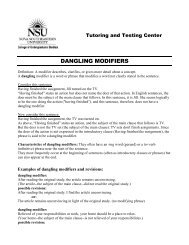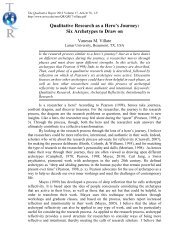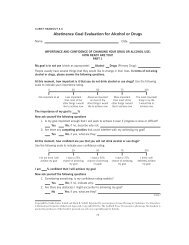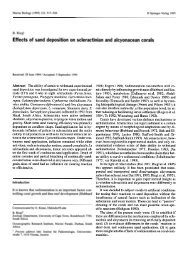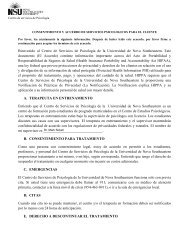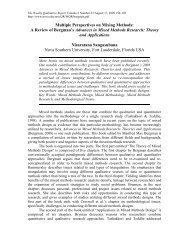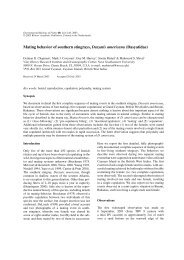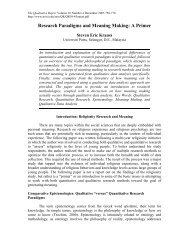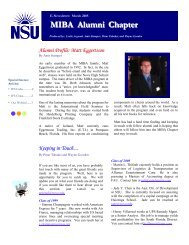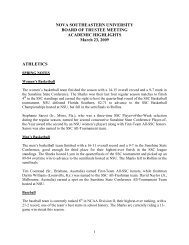Contextualizing Theories and Practices of Bricolage Research
Contextualizing Theories and Practices of Bricolage Research
Contextualizing Theories and Practices of Bricolage Research
You also want an ePaper? Increase the reach of your titles
YUMPU automatically turns print PDFs into web optimized ePapers that Google loves.
12 The Qualitative Report 2012<br />
unwittingly, implicated in the reproduction <strong>of</strong> systems <strong>of</strong> class, race, <strong>and</strong> gender<br />
oppression" (p. 164). In such contexts, Kincheloe’s critical bricoleurs work to dismantle<br />
the positivist hegemony in research which, most <strong>of</strong>ten unknowingly, supports oppressive,<br />
marginalizing, <strong>and</strong> violent social conditions. For this, Kincheloe suggests that critical<br />
hermeneutics, knowledges from the margins, <strong>and</strong> political action be infused in all<br />
bricolage projects.<br />
Critical hermeneutics is an interpretive process used to explore how power tacitly<br />
forms phenomena, texts, knowledges, <strong>and</strong> subjects (Kincheloe, 2005b). Moving beyond<br />
symbiotic hermeneutics to critical hermeneutics “alerts [bricoleurs] to the ways power [in<br />
a given contextual setting] helps construct the social, cultural, <strong>and</strong> economic conditions<br />
under which meaning is made” (p. 338). Like Denzin <strong>and</strong> Lincoln’s (1999) interpretive<br />
bricoleur, Kincheloe’s critical bricoleurs draw from a range <strong>of</strong> critical theories (e.g.,<br />
feminism, Marxism, post-colonialism), to explore the taken-for-granted ways power<br />
shapes knowledge <strong>and</strong> objects <strong>of</strong> inquiry.<br />
Watt’s (2008, 2011) work, which investigates representations <strong>of</strong> Muslim women<br />
in Western media, mirrors Kincheloe’s critical hermeneutic approach. She employes<br />
multiple theoretical lenses (e.g., feminist, anti-racist) <strong>and</strong> multiple methodological tools<br />
(e.g., semiological analysis, discursive analysis) to engage in multiple readings <strong>of</strong><br />
Muslim women's representations in various news, magazine, <strong>and</strong> television texts. Each<br />
reading shows how dominant Western contexts (saturated with power dynamics <strong>of</strong><br />
racism, xenophobia, <strong>and</strong> Islamophobia) shape Muslim women’s representations. As<br />
Kincheloe (2004a) explains, "critical hermeneutics is employed by bricoleurs to<br />
underst<strong>and</strong> the historical <strong>and</strong> social ways that power operates to shape meaning <strong>and</strong> its<br />
lived consequences" (p. 11). Watt’s (2008, 2011) study exemplifies this critical<br />
hermeneutic approach. Her interest in how racialization shapes media texts shows her<br />
underst<strong>and</strong>ing that an object <strong>of</strong> inquiry can never be quarantined from dominant powers.<br />
For Kincheloe, critical bricoleurs are "dedicated to questioning <strong>and</strong> learning from<br />
the excluded" (Kincheloe, 2004b, p. 48); they seek knowledges that are usually silenced<br />
in dominant research narratives. These actions relate to Foucault’s conceptualization <strong>of</strong><br />
subjugated knowledges (Foucault, Bertani, Fontana, Ewald, & Macey, 2003). Subjugated<br />
knowledges, for Foucault, are the “series <strong>of</strong> knowledges that have been disqualified as<br />
nonconceptual knowledges, as insufficiently elaborated knowledges: naive knowledges,<br />
hierarchically inferior knowledges, knowledges that are below the required level <strong>of</strong><br />
erudation or scientificity” (p. 7). For example, the knowledges constructed by institutions<br />
like asylums, hospitals, <strong>and</strong> schools shape dominant knowledges, while the knowledges<br />
constructed by groups like the “psychiatrized, the patient . . . the delinquent” (Foucault et<br />
al., 2003, p. 7), <strong>and</strong> the student, constitute subjugated knowledges. For Foucault <strong>and</strong><br />
Kincheloe, the culturally elite’s control over the means <strong>of</strong> knowledge production has<br />
meant that insights from the margins <strong>of</strong> societies have been subjugated.<br />
As Kincheloe (2005b) argues, critical bricoleurs are politically capable <strong>of</strong><br />
disrupting this authoritative control over knowledge production. He suggests:<br />
to contribute to social transformation, bricoleurs seek to better underst<strong>and</strong><br />
both the forces <strong>of</strong> domination that affect the lives <strong>of</strong> individuals from race,<br />
class, gender, sexual, ethnic, <strong>and</strong> religious backgrounds outside <strong>of</strong><br />
dominant culture(s) <strong>and</strong> the worldviews <strong>of</strong> such diverse peoples. In this



